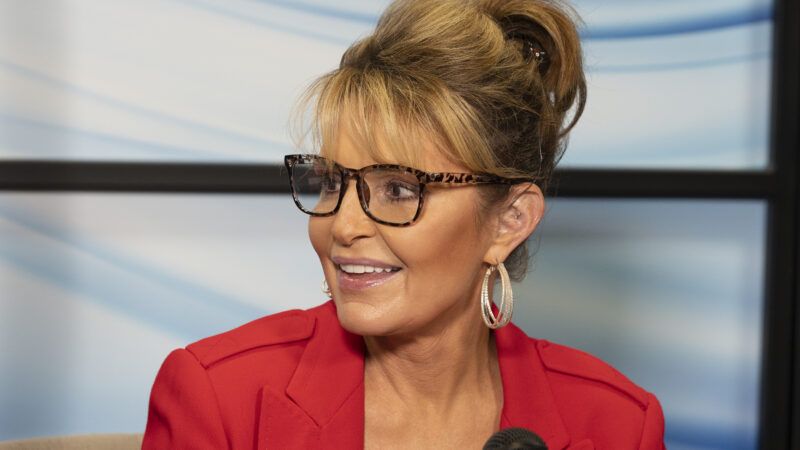Ranked Choice Voting Worked in Alaska. Sarah Palin Came to CPAC To Complain About It.
According to a recent report, the system Palin once said was "so weird" that it "results in voter suppression" worked just as well as intended.

Attendants of this year's Conservative Political Action Conference (CPAC) heard many topics of contention raised, like transgender rights or tech companies. And also, oddly enough, Alaska's U.S. House race.
In 2020, Alaskan voters approved a new electoral process in which every candidate of any party runs in the same primary, and the four with the most votes advance to the general election. On that ballot, voters rank the candidates in order of preference; if no candidate gets a majority, the lowest performer is eliminated, and their ballots are recounted with the second choices counted first, and so on until one candidate receives a majority. This process is called ranked choice voting (RCV).
After the March 2022 death of Rep. Don Young (R–Alaska), the state held a special election to fill his seat. Sarah Palin, the state's erstwhile Republican governor, was one of more than four dozen candidates competing for the seat. Despite getting a comfortable plurality of the first round's votes, she ultimately lost to Democrat Mary Peltola once all second- and third-choices were counted. The same dynamic played out again for the November general election and Peltola won reelection to a full term.
Last week, Palin traveled to the greater D.C. area to attend CPAC—not as an invited speaker but to inveigh against the voting system she blames for her loss.
Two booths dotted CPAC's event space, one for StopRCV.com, an anti-ranked choice organization, and another from a group calling itself "Alaskans for Honest Elections," dedicated to repealing the 2020 ballot measure. Art Mathias, the latter group's leader, told Insider that Palin was its national spokesperson.
Mathias further said that the system caused intra-party conflict between Palin and fellow Republican candidate Nick Begich III, and that under a traditional electoral system, Palin "would have easily won." At last year's CPAC Texas, Palin herself told the crowd about ranked choice, "It's bizarre, it's convoluted, it's confusing and it results in voter suppression," explaining that "it results in a lack of voter enthusiasm because it's so weird."
Earlier this year, Ryan Williamson, a resident fellow at the R Street Institute, a free market and limited government think tank, published a report evaluating how Alaska's electoral system performed in 2022. Despite Palin's and Mathias's scaremongering, Williamson's report found that "races in the state became more civil and competitive overall," and "despite it being a major change in process, the top-four approach caused little disruption in the composition of government."
Proponents of ranked choice voting say that it leads to more representative government, as one candidate in a crowded field can't win without eventually receiving majority support, and that it lowers the incentives to run negative campaigns. Palin's race against Peltola is a perfect example, as Williamson wrote that "Peltola ran a highly
localized, Alaska-centric campaign tied to issues like fishing, whereas her main challenger, Sarah Palin, appealed to voters through more populist, culture-war-centric issues."
Across the state, 2022 also saw more competitive races, with fewer candidates running unopposed and more candidates who won by narrow margins.
Ranked choice voting is not a panacea to the two-party system: In 2022, 90 percent of Alaskan incumbents retained their seats, only slightly below the national rate of 94 percent. But if the goal in electing a representative is to pick someone who best, you know, represents the whole of their constituency, ranked choice provides an opportunity to do just that.
"RCV leads to less divisiveness, not more," Williamson told Reason. "The new system forced candidates to appeal to a broader range of voters in order to win. That's something Peltola did well that Palin did not.
"Palin probably would have won a closed primary, but that does not mean she would have won the general. If Palin were supported by a majority of voters, then she would have won—just like the Republicans who won in the US Senate, the governorship, and a majority of both chambers of the state legislature."

Show Comments (188)